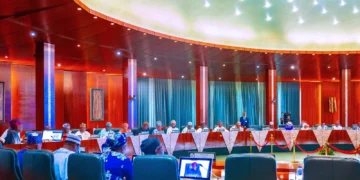Nigeria is a country with a rich and diverse religious landscape. Christianity and Islam are the two dominant faiths, with millions of adherents across the nation. Religion plays a significant role in shaping political discourse and decision-making, as well as influencing the social and moral values of the people.
However, religion can also be abused and manipulated for selfish and partisan interests. This is evident in the phenomenon of fake political prophecies that have become rampant in recent times. Some religious leaders, especially pastors and prophets, have taken to the pulpit to declare the outcome of elections, endorse candidates, or condemn opponents based on their purported revelations from God.
One of the areas where these fake religious actors have been most active and influential is politics. Nigeria has a history of political instability, violence and corruption, which have created a sense of uncertainty, anxiety and frustration among the citizens. Many Nigerians look up to religious leaders for hope, direction and solutions to their political problems. Some religious leaders have taken advantage of this situation to make false and misleading prophecies about political events, candidates and outcomes. These prophecies are often motivated by partisan interests, financial inducements or personal vendettas.
The roles of Nigerians, the media, government as well as the Christian Association of Nigeria (CAN), the Pentecostal Fellowship of Nigeria (PFN) and the leadership of the Nigerian church in addressing this menace become very imperative.
Fake political prophecies are not a new phenomenon in Nigeria. They have been prevalent since the country’s return to democracy in 1999. However, they have become more rampant and conspicuous in recent years, especially during the 2015, 2019 and 2023 general elections.
In 2015, for instance, some pastors and prophets predicted that Goodluck Jonathan, the incumbent president and candidate of the Peoples Democratic Party (PDP), would win a second term in office. They claimed that God had anointed him. However, Jonathan lost to Buhari with 44.9% of the votes against Buhari’s 53.9%.
Also, in 2019, some pastors and prophets predicted that Atiku Abubakar, the candidate of the Peoples Democratic Party (PDP), would defeat Muhammadu Buhari, the incumbent president and candidate of the APC, in the presidential election. They claimed that God had revealed to them that Atiku was his chosen one or that Buhari would die before the election. However, Buhari won the election with 55.6% of the votes, while Atiku got 41.2%.
In the 2023 presidential election, Bola Tinubu of the APC defeated his main rivals, Atiku Abubakar of the PDP and Peter Obi of the Labour Party (LP), in a keenly contested race that was marred by allegations of rigging, violence and intimidation. However, before the election, several pastors and clerics had predicted that Tinubu would not be sworn-in as president, because of his perceived unpopularity and allegedly rigged election. Some even claimed that God had revealed to them that Atiku or Obi would win the election or that there would be an interim government or a military coup on May 29, 2023.
These prophecies turned out to be false and baseless as Tinubu was duly sworn-in as Nigeria’s 16th president on May 29, 2023. The false prophecies did not only expose the dishonesty and incompetence of the fake prophets, but also caused confusion, disappointment and resentment among their followers and supporters. Some Nigerians lost faith in religion and became cynical about its role in politics. Some others became more radicalised and violent in their opposition to Tinubu’s emergence. Some even blamed God for allowing Tinubu to become president.
In my opinion, I believe political prophecies are majorly triggered by religious fanaticism, poverty, hardship and political manipulation.
Poverty and hardship refer to a situation where some Nigerians face a desperate need for change and improvement in their living conditions. This desperation leads them to look up to some religious leaders who promise them miracles or solutions to their problems through prayers or prophecies. They hope that God will intervene in their favour through these means.
Similarly, fake political prophecies can incite violence and conflict among Nigerians. They can fuel hatred and intolerance among different religious groups who view each other as enemies and as was the case during the 2023 elections. They also provoke resentment and hostility against some politicians or parties who are perceived as enemies or threats by some religious leaders or followers.
Ending this menace lies in a collective effort by all stakeholders in the society: religious leaders, civil society groups, media organisations and citizens. However, the Christian Association of Nigeria (CAN), the Pentecostal Fellowship of Nigeria (PFN) and Nigerian church leaders have the most vital role to play in addressing fake political prophecies in Nigeria. Without been prompted, they must all speak out against fake political prophecies and denounce those who make them publicly.
Media organidations also have a mandate to inform and enlighten the public about political issues and events without bias or sensationalism. They should not give undue attention or publicity to fake political prophecies or their makers. They must, as a form of public service, hold accountable religious leaders who make fake prophecies by naming and shaming them.
Fake political prophecies are a serious threat to Nigeria’s democracy, stability and unity. Hence, they must be exposed and eliminated by all means possible before they cause more harm to the nation. Nigerians must realise that God does not need any human intermediary to reveal His will or plan for their country or its leaders. He has given them His word in the scriptures and His spirit in their hearts to guide them into all truth.




